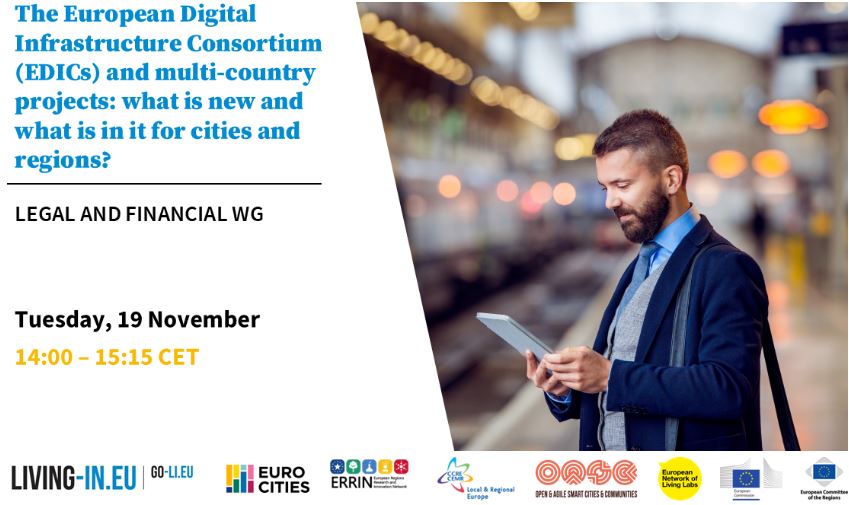Online Event Recap: How EDICs and Multi-Country Projects Benefit Cities and Regions
On November 19, 2024, Living-in.EU signatories gathered online to explore the topic “The European Digital Infrastructure Consortium (EDICs) and Multi-Country Projects: What’s New and What’s in It for Cities and Regions?”. Organized by Living-in.EU in the context of the Legal & Financial Working Group, this engaging session shed light on recent developments, opportunities, and challenges surrounding EDICs and their implications for cities and regions.
What are EDICs?
Beata Bartosova, Programme Manager at DG CNECT, began by outlining the role of EDICs in driving large-scale digital transformation across the EU. EDICs, part of the Digital Decade Policy Programme, enable member states to pool resources to achieve collective digital goals that would be unattainable by individual countries.
Key features of EDICs include:
-
Rapid setup and flexible implementation.
-
A legal structure allowing cities, regions, and other entities to participate alongside member states.
-
Financial backing from member states, supplemented by EU funds and external contributions.
Recent updates highlighted the growing portfolio of EDICs, including the LDT CitiVerse and EUROPEUM Blockchain EDICs, and plans to establish new projects focusing on mobility, cybersecurity, and healthcare.
LDT CitiVerse: A Vision for Smart Cities
Ernesto Faubel and Jordi Ortuno Ribé presented the latest progress in the LDT CitiVerse EDIC, an initiative dedicated to fostering smart city ecosystems in Europe. With 13 member states already committed, the consortium emphasizes collaboration across sectors to advance urban innovation.
The LDT Toolbox, a key deliverable, offers practical tools for cities of all sizes to implement AI and data-driven projects. The first General Assembly is set for December 2024 in Valencia, marking a significant milestone for this EDIC.
EUCAIM: Transforming Medical Imaging
The session also featured a deep dive into the EUCAIM project, which seeks to revolutionize medical imaging by integrating data with genetics and AI. Coordinated by La Fe Health Research Institute, EUCAIM aims to enhance healthcare delivery and support innovation within the European Health Data Space.
Luís Martí Bonmatí presented some of the achievements so far, including centralizing access to medical data and tools, building capacity for data interoperability, and ensuring long-term sustainability. The project envisions evolving into a legal entity under an EDIC framework.
Engaging Cities and Regions
Throughout the session, speakers emphasized the potential for cities and regions to play an active role in EDICs. While participation requires compliance with specific conditions, opportunities abound for cities to influence the direction of multi-country projects, benefit from shared resources, and contribute to policy goals like the Digital Decade targets.
Looking Ahead
As EDICs continue to expand, initiatives like the LDT CitiVerse and EUCAIM exemplify how collaboration can drive meaningful progress. Living-in.EU will continue following developments of the EDICs and sharing relevant updates and information with Living-in.EU signatories.
To access the slides and recording from the session, sign in into the Finacial WG space!








